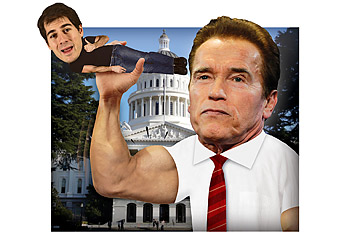
I live in a part of liberal Los Angeles that is so liberal that when I walked in to vote, the liberal woman walking out looked at liberal me and my liberal baby and liberally said, "Too bad he's going to grow up under Republican rule." And while I did vote entirely Democratic this year—when you live in an area this liberal, your Republican nominee for the state senate is an anti-immigrant, Islamophobic surfing Hasidic rabbi—I kind of enjoy seeing my smug neighbors rend their overpriced sweatpants over a slight Republican advantage in the lower house of Congress.
Our system is strong enough to withstand a minirevolution of inexperienced punks every once in a while. In 2003, when Arnold Schwarzenegger won a freak-show recall election—beating out Gary Coleman and Larry Flynt—he was a joke too: the bodybuilder turned action hero who couldn't pronounce the name of his own state. When he announced his candidacy on The Tonight Show, he echoed the heavy sense of duty in George Washington's first Inaugural Address, saying, "It's the most difficult [decision] I've made in my entire life, except the one I made in 1978 when I decided to get a bikini wax."
Seven years later, Schwarzenegger has become one of the more respected governors in the country, and that's not just compared to Rod Blagojevich and Mark Sanford. He's made California the leader in greenhouse-gas reduction, stem-cell research, fighting for gay marriage and reforming workers' compensation. Sure, he proved far better at ideas than execution, completely failing to fix the state's enormous budget crisis. But in an era of partisanship, he was one of the few in the reasonable middle. As a leader, he's been optimistic, progressive, spotlight-seeking and tan. Having Schwarzenegger as my governor has seemed perfectly Californian, in the same way that Governor Dave Freudenthal is perfectly Wyomingite, in that no one has ever heard of him.
Schwarzenegger's failure to completely fail makes me feel as if things will be O.K. despite the Tea Party's victories. Ridiculous-seeming candidates can become excellent leaders. As Lou Cannon, a historian who has written five books on Ronald Reagan, told me, when Reagan first ran for governor, people thought his candidacy was even more preposterous than when Schwarzenegger ran. Cannon said people who knew Schwarzenegger only as an actor underestimated his experience and ability. Though not as an actor. They got that right. "I had high hopes for him. He had a great staff. He had things very few people in public life have. He had a real opportunity to solve a lot of problems," Cannon said, before getting off the phone to, I assume, write another book about Reagan.
To hear what happens to new politicians thrust onto the national stage, I called Democratic Senator Ted Kaufman, Joe Biden's replacement, who has never run for office but did a great job for the past two years. The Senate, he insisted, is filled with smart, thoughtful people. "I came away incredibly impressed with the group," he said. He even broke basic party rules and, less than 24 hours before Election Day, cited Republicans John Barrasso, Mike Johanns, Jeff Sessions and Jim Risch as people of great intellect who strive to determine what's best for the country. When I pressed him to see whether the entire Senate was sitting in his office listening on speakerphone and threatening him with senatorial noogies, he countered, "Listen to a Senate hearing. Listen to the amount of knowledge some of these Senators have on some esoteric matters." Bluff well called, Senator.
Better yet, Kaufman said the founders designed the Senate to prevent much legislation from passing, in case the voters pick idiots. And he thinks the few idiots who might have been elected will soon be kicked out. "If the voters make a mistake, they'll get rid of them pretty quickly," he said. Most politicians change the system a little and let the system change them a little more. It's just like all the improvements you thought you'd make when you got your promotion at work, before you found out you're still not allowed to fire everyone. I am a little nervous about the fact that my editor inserted the previous sentence.
Yes, there's still a window for dangerous decisionmaking, but our system does eventually self-correct. So it's not surprising that after seven years of a governor with no political experience, our state elected former governor Jerry Brown, a man most of us assumed had died in the early 1980s. If he does well, I can look forward to the 2014 gubernatorial Justin Bieber landslide.
